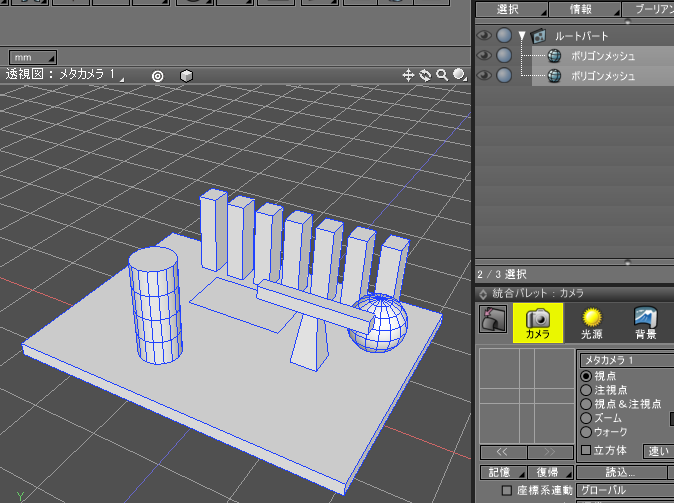ポリゴンメッシュ内の直方体を構成する面を選択 (スクリプト)
ブラウザで選択したポリゴンメッシュのうち、
8頂点/6面で構成される直方体の面を選択するスクリプトです。
import numpy
import math
scene = xshade.scene()
# ----------------------------------------------------------.
# ポリゴンメッシュの隣接する面をたどり、面ごとのシェル番号を割り当て.
# @param[in] shape 対象ポリゴンメッシュ.
# @return 面ごとのシェル番号(0-)の配列.
# ----------------------------------------------------------.
def getMeshShellIndex (shape):
if shape.type != 7: # ポリゴンメッシュでない場合.
return None
facesCou = shape.number_of_faces
versCou = shape.total_number_of_control_points
faceGIndexList = [-1] * facesCou
# 頂点が共有する4頂点を持つ面のリストを作成.
vFacesList = []
for i in range(versCou):
vFacesList.append([])
for i in range(facesCou):
f = shape.face(i)
vCou = f.number_of_vertices
if vCou < 3:
continue
for j in range(vCou):
vIndex = f.vertex_indices[j]
vFacesList[vIndex].append(i)
# 隣接する面をたどり、インデックスを割り当てていく.
fNewIndex = 0
for fLoop in range(facesCou):
if faceGIndexList[fLoop] >= 0:
continue
f = shape.face(fLoop)
vCou = f.number_of_vertices
if vCou < 3:
continue
faceIList = [fLoop]
while len(faceIList):
fCurIndex = faceIList[0]
if faceGIndexList[fCurIndex] >= 0:
faceIList.pop(0)
continue
f = shape.face(fCurIndex)
vCou = f.number_of_vertices
if vCou < 3:
faceIList.pop(0)
continue
faceGIndexList[fCurIndex] = fNewIndex
for i in range(vCou):
i1 = f.vertex_indices[i]
i2 = f.vertex_indices[(i + 1) % vCou]
fList1 = vFacesList[i1]
for j in range(len(fList1)):
fI = fList1[j]
if fI == fLoop or faceGIndexList[fI] >= 0:
continue
iCou = 0
f2 = shape.face(fI)
vCou2 = f2.number_of_vertices
if vCou2 < 3:
continue
for k in range(vCou2):
vI = f2.vertex_indices[k]
if vI == i1 or vI == i2:
iCou += 1
if iCou == 2:
faceIList.append(fI)
faceIList.pop(0)
fNewIndex += 1
return faceGIndexList
# ----------------------------------------------------------.
# ポリゴンメッシュの6つの四角形面が直方体を構成しているかチェック.
# @param[in] shape 対象形状.
# @param[in] faceList 直方体の6面のインデックス.
# @return 直方体の場合はTrue, その後に6面の対面の番号を0-2で入れる配列.
# ----------------------------------------------------------.
def checkBox (shape, faceList):
if len(faceList) != 6:
return False, None
# 向かい合う面の組み合わせが3つあれば直方体と判断.
fDList = [-1] * 6
index = 0
for i in range(6):
if fDList[i] >= 0:
continue
# 面法線.
fNormal1 = shape.get_plane_equation(faceList[i])
fNormal1 = numpy.array([fNormal1[0], fNormal1[1], fNormal1[2]])
for j in range(i + 1, 6):
if fDList[j] >= 0:
continue
# 面法線.
fNormal2 = shape.get_plane_equation(faceList[j])
fNormal2 = numpy.array([fNormal2[0], fNormal2[1], fNormal2[2]])
# fNormal1とfNormal2が対面になっているか.
v = numpy.dot(fNormal1, fNormal2)
if math.fabs(v) > 0.999:
fDList[i] = index
fDList[j] = index
index += 1
break
if index != 3:
return False, None
return True, fDList
# ----------------------------------------------------------.
# ポリゴンメッシュから直方体を構成する面番号の配列を返す.
# @param[in] shape 対象形状.
# @return 直方体を構成する面の配列を [][6]で返す.
# ----------------------------------------------------------.
def getBoxFaces (shape):
if shape.type != 7: # ポリゴンメッシュでない場合.
return None
shape.setup_plane_equation()
facesCou = shape.number_of_faces
versCou = shape.total_number_of_control_points
if facesCou < 6 or versCou < 8:
return None
# 面ごとのシェル番号を取得.
faceShellIndex = getMeshShellIndex(shape)
maxShellIndex = -1
for shellIndex in range(facesCou):
if faceShellIndex[shellIndex] > maxShellIndex:
maxShellIndex = faceShellIndex[shellIndex]
if maxShellIndex < 0:
return None
# 直方体を構成する四角形面の面番号の配列を取得.
retBoxList = []
for shellIndex in range(maxShellIndex + 1):
fList = []
for i in range(len(faceShellIndex)):
if faceShellIndex[i] == shellIndex:
fList.append(i)
# 6面で構成されるか.
fCou = len(fList)
if fCou != 6:
continue
# すべての面が四角形で構成されるか.
fCou2 = 0
for i in range(fCou):
f = shape.face(fList[i])
if f.number_of_vertices == 4:
fCou2 += 1
if fCou2 != 6:
continue
# fListに格納された面が直方体を構成するかチェック.
retV = checkBox(shape, fList)
if retV[0]:
retBoxList.append(fList)
return retBoxList
# -------------------------------------.
# 形状編集モード + 面選択モードに移行.
scene.enter_modify_mode()
scene.selection_mode = 0
for shape in scene.active_shapes:
# すべての選択を解除.
shape.select_all_control_points(False)
# ポリゴンメッシュで直方体を構成する面番号を取得.
boxList = getBoxFaces(shape)
if len(boxList) > 0:
print "[" + shape.name + "] : 直方体の数 " + str(len(boxList))
# 直方体を構成する面を選択.
for faceList in boxList:
for faceIndex in faceList:
shape.face(faceIndex).active = True
scene.update_figure_window()
使い方
ブラウザで調査対象のポリゴンメッシュを選択します。

上記のスクリプトをスクリプトウィンドウにコピー&ペーストし実行します。
以下のように、8頂点/6面で構成される直方体を構成する面のみ選択されます。
